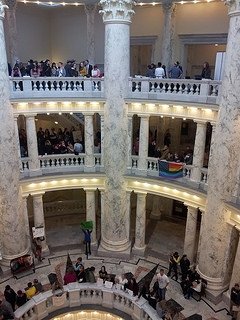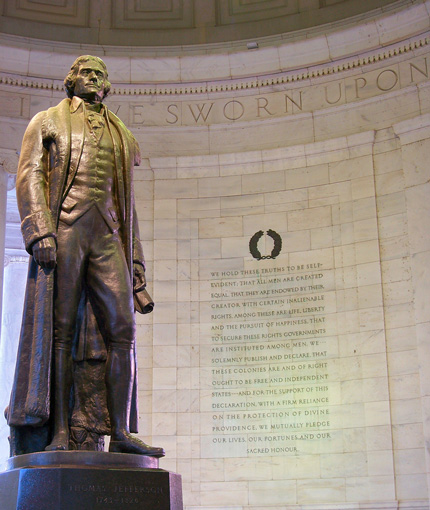By Lucan Chartier –

[dc]R[/dc]ep. Lynn Luker of Idaho has recently placed two bills before the state’s House of Representatives. HB 426 prohibits the denial, revocation, or suspension of “any professional or occupational license or registration” based upon the exercise or expression of religious belief. HB 427 would amend § 73-402 of the Idaho Code – the state’s mini-Religious Freedom Restoration Act (RFRA) – to also provide relief against “any person relying upon any government action, enactment, or law” that substantially burdens a sincerely held religious belief.
While most of the resultant controversy has centered on the potential repercussions (or lack thereof) for refusing to provide services to homosexual couples, 426 in particular has been the recipient of heavy criticism beyond the scope of gay marriage. Questions of refusal of medical services, such as a Jehovah’s Witness doctor declining to provide a blood transfusion, are largely moot as the bill specifically includes an exemption for emergency response duties and other conduct covered under the state’s Emergency Medical Treatment and Active Labor Act.
On the other hand, medical licenses themselves are a valid issue for consideration. If a practicing physician came to embrace the Breatharian religion, and consequently refused to provide a patient with food and water, such a physician’s license would be protected under HB 426. Similar issues are likely to arise at the intersection of medical licensing and religions such as Scientology and Christian Science, which disavow the use of mental health and medicinal treatment, respectively.
In an interview with the Idaho Statesman, Rep. Luker defended the proposed bill by explaining that “if you make a decision (to refuse service or to not participate) based on sincerely held religious beliefs, to act or not act, you can not lose your license. It doesn’t mean you can’t be fired from your job. It doesn’t mean that you can’t be sued for discrimination.”
Critics point out that Idaho’s RFRA already provides for business license and religious land use defenses. Given the lack of case law to the contrary, the necessity of HB 426 does seem questionable. Ultimately, both proposed bills seem to be a legislative response to Elane Photography v. Willock, a case currently awaiting writ of certiorari from the U.S. Supreme Court and which Rep. Luker cited as an example of what his bills are meant to protect against.
Elane Photography began as a New Mexico case involving the New Mexico Human Rights Act (NMHRA), the New Mexico RFRA, and First Amendment free speech protection. In 2003, the NMHRA was amended to add the words “sexual orientation” to the list of protected classes such as race and religion. Elane Photography is a wedding photography business offering its services to the public, and was contacted by Vanessa Willock to photograph a “commitment ceremony.” Upon learning the ceremony would be between two women, Elane Photography declined on the basis of the owner’s religious objection to promoting, endorsing, or participating in same-sex marriage.
Willock filed a discrimination suit in response, citing the NMHRA’s protection of sexual orientation. Elane Photography’s defense relied upon the New Mexico RFRA and the First Amendment. The New Mexico Supreme Court affirmed the ruling against Elane Photography on the grounds that the state’s RFRA was not applicable in private-party suits; a decision that puts the state on one side of a national split regarding the RFRA’s applicability in such cases. It also rejected the defense of photography as protected free speech, as there was no government mandate of a specific message to be conveyed. While the U.S. Supreme Court has been asked to hear arguments regarding the free speech issue, the question of whether the RFRA and its state-enacted replications can be applied in private-party suits is what HB 427 is aimed to clarify.
Presently, federal circuits are divided almost evenly regarding whether the RFRA can be cited in cases where a private party relies upon federal law to burden another party’s sincerely held beliefs. McGill v. General Conference Corporation of Seventh-day Adventists was a recent attempt to obtain a Supreme Court ruling on the issue, but was denied writ of certiorari. Consequently, state efforts to clarify their positions on this issue are a necessity. I believe HB 427 is a well-conceived effort in this line, and one that other states with mini-RFRA legislation – as well as Congress – should take steps to replicate.
As an Adventist, the idea of a religious corporation using civil authority to burden the religious beliefs of others is central to my understanding of both history and prophecy. The history of religious persecution is replete with examples of two elements combining; a government element, which of itself has no interest in persecuting, and a religious element, which of itself has no ability to persecute. Given that corporations – religious or otherwise – are considered “persons” in U.S. jurisprudence, legislation that provides relief against a person relying on a government action, enactment, or law to substantially burden religious practice is a necessary protection.
The applications of HB 426, however, are less clear-cut. The lack of a compelling interest test as a balancing factor in the bill presents a serious issue to its integrity. Without such a provision, concerns regarding medical licensing, equal opportunity employment, wage equality, and client discrimination are valid and alarming. Inevitably, any legislation aimed at protecting religious liberty will be subjected to a compelling interest test in one form or another when claims are brought before the courts.
There is no question that the government has a compelling interest in protecting its citizens from discrimination; religious convictions are insufficient to sustain Jim Crow laws, are insufficient to support lower wages for women, and a host of other social inequality issues. As currently written, HB 426 would allow all of the above; a refusal to serve African American or Jewish patrons based on religious beliefs of racial inferiority would be protected, as would providing female workers lower wages based on a religious belief that men are to be the bread winners.
The addition of a compelling interest test, however, may serve to undermine its core intent – protecting business owners and professionals who do not wish to participate in homosexual weddings, place children with homosexual couples, etc. Ultimately, HB 426 falls short of addressing the real issue at hand – whether sexual orientation should be a protected class. If the answer is yes, then any legislation allowing business owners to refuse service to homosexuals must of necessity also allow them to refuse service based on race, color, religion, sex, or national origin under the same circumstances. If the answer is no, then bills such as HB 426 are superfluous; there is no basis for losing one’s license, as there is no basis for a discrimination claim for refusing to provide service.
The ramifications of a “yes” have potentially far-reaching implications for religiously motivated business owners; the ramifications of a “no” have potentially far-reaching implications for homosexual rights to housing, employment, and education. I do not see an easy answer, but what is clear is that HB 426 is not an effective solution; the real question for discussion is the one being advanced by the “Add the Words” protesters outside the Capitol.
###
Lucan Chartier writes from the Pacific Northwest.
